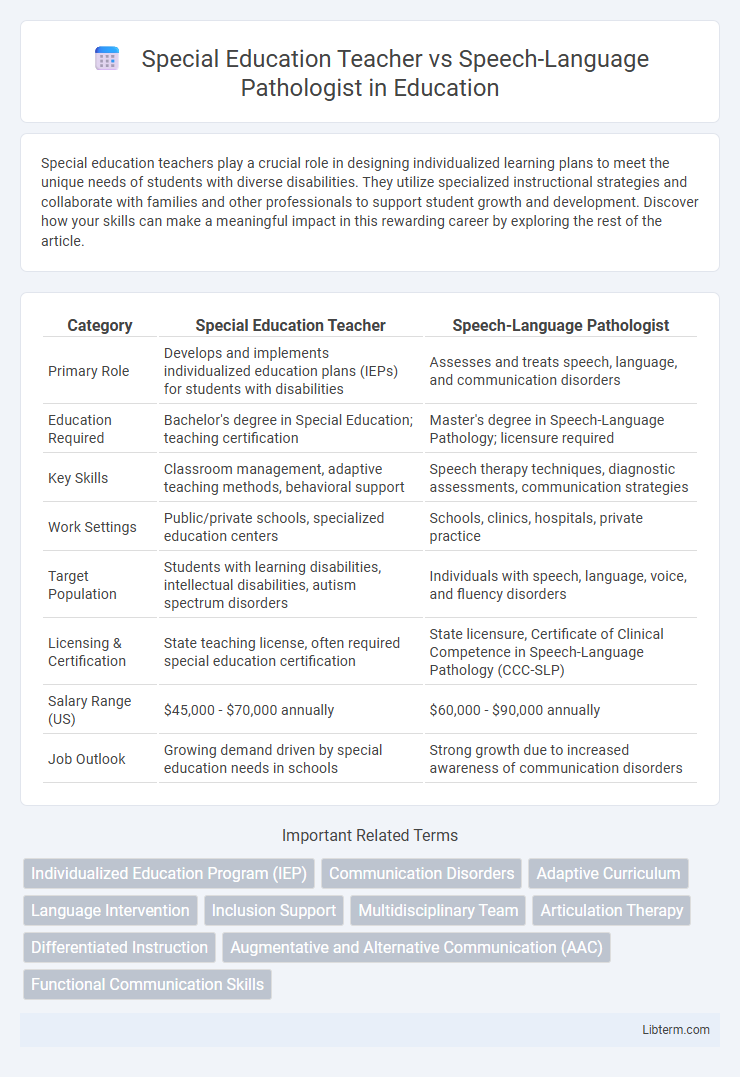Special education teachers play a crucial role in designing individualized learning plans to meet the unique needs of students with diverse disabilities. They utilize specialized instructional strategies and collaborate with families and other professionals to support student growth and development. Discover how your skills can make a meaningful impact in this rewarding career by exploring the rest of the article.
Table of Comparison
| Category | Special Education Teacher | Speech-Language Pathologist |
|---|---|---|
| Primary Role | Develops and implements individualized education plans (IEPs) for students with disabilities | Assesses and treats speech, language, and communication disorders |
| Education Required | Bachelor's degree in Special Education; teaching certification | Master's degree in Speech-Language Pathology; licensure required |
| Key Skills | Classroom management, adaptive teaching methods, behavioral support | Speech therapy techniques, diagnostic assessments, communication strategies |
| Work Settings | Public/private schools, specialized education centers | Schools, clinics, hospitals, private practice |
| Target Population | Students with learning disabilities, intellectual disabilities, autism spectrum disorders | Individuals with speech, language, voice, and fluency disorders |
| Licensing & Certification | State teaching license, often required special education certification | State licensure, Certificate of Clinical Competence in Speech-Language Pathology (CCC-SLP) |
| Salary Range (US) | $45,000 - $70,000 annually | $60,000 - $90,000 annually |
| Job Outlook | Growing demand driven by special education needs in schools | Strong growth due to increased awareness of communication disorders |
Overview of Special Education Teachers and Speech-Language Pathologists
Special Education Teachers design tailored instructional plans to support students with diverse learning disabilities and developmental challenges, aiming to improve academic achievement and social skills. Speech-Language Pathologists assess and treat communication disorders, focusing on speech, language, voice, and fluency to enhance verbal and non-verbal communication abilities. Both professions require specialized training and certifications to address unique student needs within educational and clinical settings.
Key Roles and Responsibilities
Special Education Teachers design individualized education programs (IEPs) and adapt curriculum to support students with diverse learning needs, specializing in academic and social development. Speech-Language Pathologists assess, diagnose, and treat communication disorders, including speech, language, and swallowing difficulties, to improve effective communication skills. Both professionals collaborate closely to enhance student outcomes, with Special Education Teachers focusing on overall educational goals and Speech-Language Pathologists targeting specific speech and language interventions.
Required Education and Certifications
Special Education Teachers must earn a bachelor's degree in special education or a related field and obtain state certification or licensure to teach students with disabilities. Speech-Language Pathologists require a master's degree in speech-language pathology, completion of a clinical fellowship, and national certification from the American Speech-Language-Hearing Association (ASHA), along with state licensure. Both professions demand ongoing professional development to maintain certifications and stay current with educational and therapeutic best practices.
Core Skills and Competencies
Special Education Teachers demonstrate strong classroom management, individualized instruction, and adaptive teaching strategies tailored to students with diverse learning needs, emphasizing behavioral interventions and curriculum modifications. Speech-Language Pathologists possess expertise in assessing and treating communication disorders, utilizing phonetics, voice therapy, and language development techniques to enhance speech and language abilities. Both roles require collaboration skills, patience, and a deep understanding of developmental and educational psychology to support student progress effectively.
Work Environments and Settings
Special Education Teachers primarily work in public and private schools, specializing in classrooms designed to support students with diverse learning disabilities and developmental challenges. Speech-Language Pathologists operate in a wider range of environments, including schools, hospitals, rehabilitation centers, and private clinics, where they provide therapy to individuals with speech, language, and communication disorders. Both professions require collaboration with educators, families, and healthcare professionals to create effective, individualized intervention plans.
Student Populations Served
Special education teachers primarily serve students with diverse learning disabilities, developmental delays, and emotional or behavioral disorders, tailoring individualized education plans (IEPs) to meet academic and social needs. Speech-language pathologists focus on students with communication disorders, including speech, language, voice, and fluency impairments, often working with children who have autism spectrum disorder, cerebral palsy, or hearing loss. Both professionals collaborate within educational settings to support overlapping student populations requiring specialized interventions for successful learning outcomes.
Collaboration with Other Professionals
Special education teachers work closely with speech-language pathologists to develop individualized education programs (IEPs) addressing students' unique communication and learning needs. Speech-language pathologists provide targeted interventions for speech and language disorders, while special education teachers implement these strategies within the classroom setting. Effective collaboration enhances student outcomes by integrating specialized language support with broader educational goals.
Career Growth and Advancement Opportunities
Special Education Teachers experience steady career growth through roles such as lead teachers, program coordinators, or administrative positions, frequently benefiting from continuing education and specialized certifications. Speech-Language Pathologists have strong advancement opportunities by pursuing clinical specialization, supervisory roles, or moving into research and academic positions, supported by licensure and advanced degrees. Both careers offer pathways for professional development, but SLPs often see faster salary increases and broader settings for advancement due to high demand in healthcare and educational environments.
Salary Expectations and Job Outlook
Special Education Teachers have a median annual salary of about $62,000, with job growth projected at 8% from 2022 to 2032, reflecting steady demand in schools for individualized instruction. Speech-Language Pathologists earn a higher median salary near $80,000 per year, with a faster job growth rate of 21% due to increasing awareness of communication disorders and expanding healthcare settings. Both careers require specialized training, but Speech-Language Pathologists benefit from higher earning potential and stronger job outlook driven by diverse employment opportunities.
Choosing the Right Path: Factors to Consider
Choosing between a Special Education Teacher and a Speech-Language Pathologist depends on individual strengths, interests, and career goals. Consider factors such as working directly with students to support academic and behavioral development versus specializing in diagnosing and treating communication disorders. Evaluation of the educational requirements, work settings, and preferred interactions with children or adults greatly influences the decision to pursue one career path over the other.
Special Education Teacher Infographic

 libterm.com
libterm.com